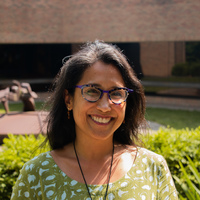Message from the Director
Decolonizing an Imperial Archive
Hello! Thank you for visiting our digital exhibit The Philippines and the University of Michigan, 1870s–1935. This project is a collaboration between the Department of History and the Bentley Historical Library at the University of Michigan, and one of a series of public history projects known as Michigan in the World. This website is the product of original research carried out by six Bentley Fellows, University of Michigan undergraduates who were selected for their research experience and interest in the topic. They worked for an intensive 30 hours per week for eight weeks during the summer of 2019, locating and analyzing sources in order to produce the pages you see here.
When we started this project, our goals were threefold. First, to provide valuable research and technical experience to a select group of undergraduates. Second, to foster collaboration between academic historians and archivists as a means of developing strategies to integrate primary source materials into teaching. Third, to illuminate some important historical connections among the University of Michigan, the state of Michigan and the Philippines for a general audience. By the end of the fellowship term, we accomplished much of what we set out to do. But we also individually and collectively struggled with what it means to do research with sources that not only documented but often had a hand in producing American imperialism in the early twentieth century: Photographs that were circulated as propaganda in the continental US to show Filipinos as “savages” in need of the US civilizing mission; essays written by Filipino schoolchildren, in a language not their own, geared toward inculcating them with “American” values; descriptions and images of brutality at the hands of American soldiers during the Philippine-American War. We were troubled by how few Filipino actors or voices were represented in the archive, how one-sided the first-hand accounts—so essential for the writing of history—seemed to be. Even the less overtly controversial histories in the archives, like the early archaeological expeditions of UM faculty in the islands, suggested complicity with American imperial rule over its “little brown brothers.” It was hard not to wonder if our research as affiliates of an institution so intimately involved in the Philippines’ colonization would be complicit too.
Rather than be paralyzed by the association with an institution so central in the colonial production of knowledge about the Philippines, MITW Fellows approached the imperial archive in critical, creative ways. Many posts here tell not only some of the who/what/when of Michigan’s historical involvement in the American colonial Philippines, but also the how of unearthing that history. In these essays, you will see self-reflexivity about finding and reading sources appear as an integral component of historical research. You will find connections drawn between the American occupation of the Philippines in the early twentieth century, and its occupation of other lands and peoples in the twenty-first. You will discover that the researcher's expression of affect--disgust, horror, anger, admiration--need not compromise the rigorous chronicling of events and figures. Our exhibit thus offers a primer in critical historical methods as much as it offers an introduction to a particular episode in the history of American empire and the history of the Philippines.
Furthermore, our MITW fellows designed many of these posts to be directly adopted for classroom teaching. Click on the tab “Through the American Lens,” or navigate to the post "Gender and the Imperial Gaze," for collections that ask visitors to consider colonial photographs of the Philippines. Among these posts are a number of questions that guide viewers through thinking critically about the role of visual technology in the making and maintenance of empire.
The Philippine collections at the Bentley Library of the University of Michigan make up what we, over the course of the fellowship, came to call a “difficult archive,” for its ambivalent involvement in producing the very subject it illuminates. Whether the topics herein are unfamiliar to you or you are a seasoned expert in the field, we hope our exhibit brings you new knowledge and new approaches to the historical study of empire.

